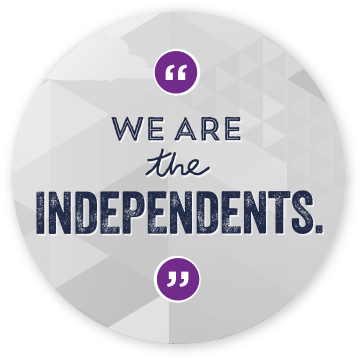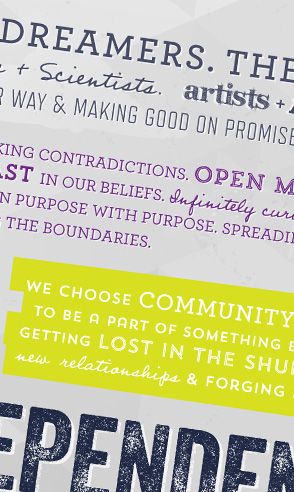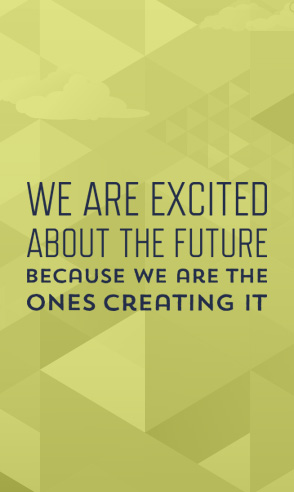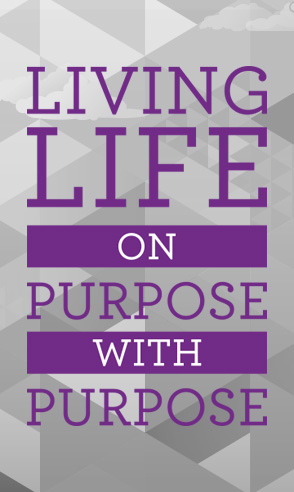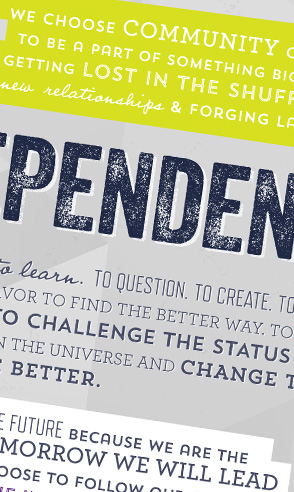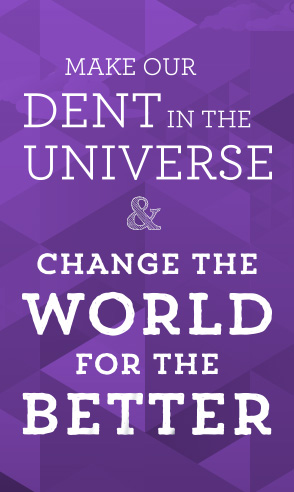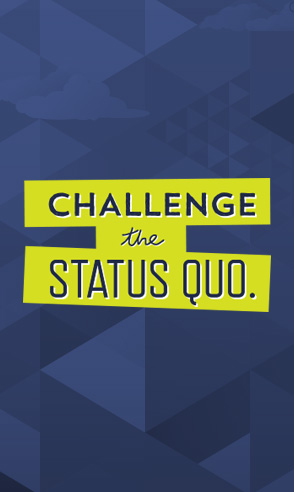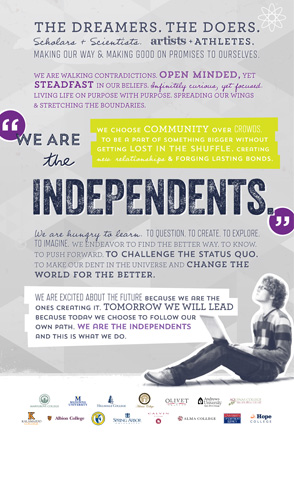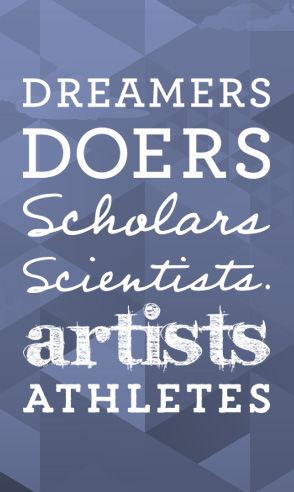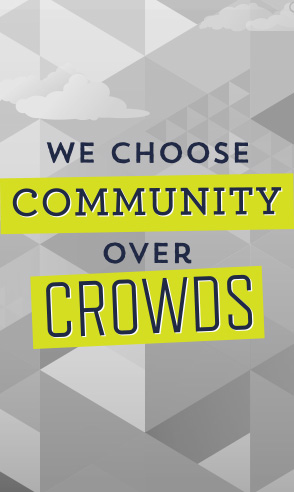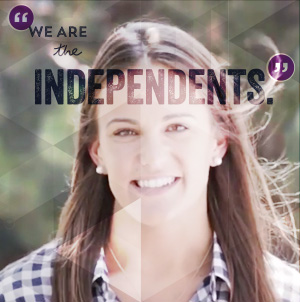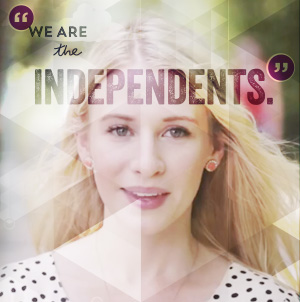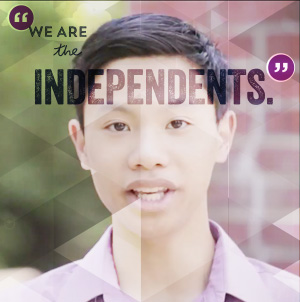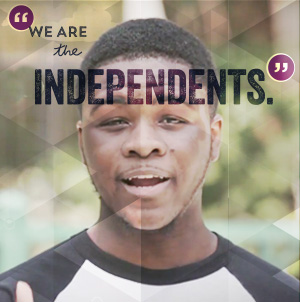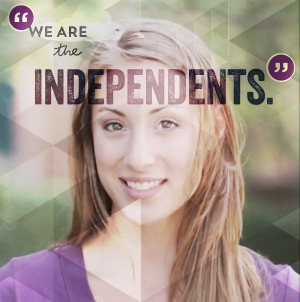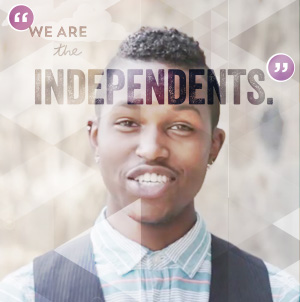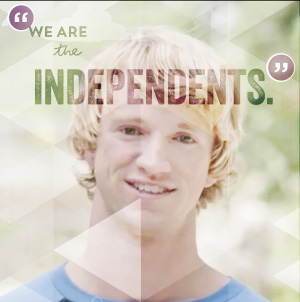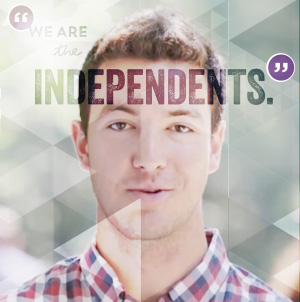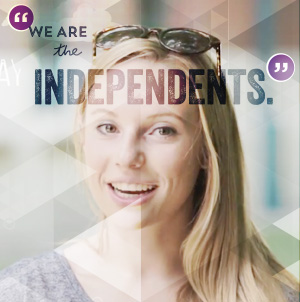Archive for
Andrews University Student Association 2025-26 Senator Projects
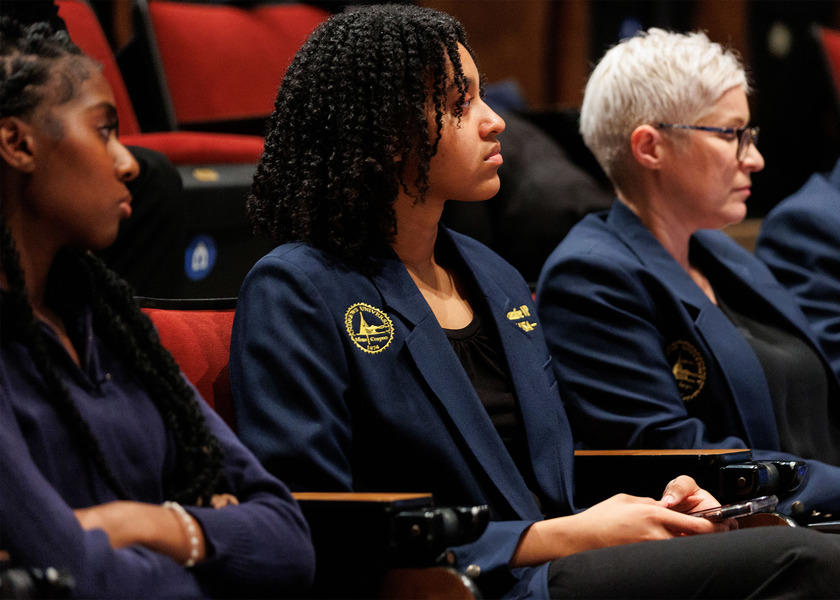
Each year, members of the Andrews University Student Association (AUSA) Senate are required to complete a campus-wide project that works to improve the student experience. This year, as the executive vice president of AUSA, I had the privilege of managing 27 senators as they completed great projects all around campus. Each project has a label indicating that it was “donated by the AUSA Senate 2025-26,” so keep an eye out for them around campus. Below is a list of each project and the senators who accomplished them.
1. Feminine products in various campus bathrooms: Rohannah Riley (junior, elementary education) and Celeste Velinova (junior, digital communications)
For this project, Riley and Velinova placed baskets of free menstrual products in the women’s bathrooms in Buller Hall, Nethery Hall, Harrigan Hall, and Bell Hall for students to use.
2. Cookware for Burman Kitchen: Yuseli Ochoa (senior, Spanish and speech-language pathology and audiology) and Niels ten Caat (sophomore, history)
For this project, Ochoa and ten Caat placed a new 23-piece nonstick ceramic cookware set in University Towers for students to check out and use.
3. Games for Lamson Hall: Nora Jean-Francois (junior, psychology), Shannon Barrow (sophomore, computer engineering), and Melody Pemberton (junior, history and secondary education)
For this project, senators purchased new board and card games (Uno, Dutch Blitz, Monopoly and Apples to Apples) to replace old games. Students can check out the games from the Lamson front desk to enjoy with their friends.
4. Study Bible Guides: Pau Khual (freshman, theology) and John Hakobyan (senior, computer science and history)
For this project, senators provided free Bible study guides for small groups to give students the resources needed to study the Word and grow in their faith. Students were encouraged to fill out the form the senators created in order to obtain a copy of the guide through the Center for Faith and Engagement (CFE).
5. Nintendo Switch and Games: Zachary Kis (sophomore, aviation) and Dean Caleb (sophomore, psychology)
For this project, senators purchased a Nintendo Switch and the games “Mario Kart” and “Super Smash Bros” for students to play in the AUSA recreational center downstairs in the campus center. Students can check the switch out at the front desk in the rec center.
6. PlayStation 5 (PS5) Headphones and Games: Donnie Vanterpool (senior, information systems) and Dean Caleb
For this project, senators purchased headphones for students to use while playing the PS5 in the AUSA recreational center downstairs in the campus center. They also added the games “EA Sports College Football 25” and “NBA 2K” to the PS5 and advocated for better ways to check out equipment from the rec center front desk.
7. Sports Equipment Replacement in Meier Hall: Raymond Manento (senior, computer science)
For this project, Manento replaced the basketballs and footballs found at the Meier front desk that students check out to use outside and ensured the proper storage and maintenance of the new equipment.8
8. New Ping Pong Table: Jonathan Pelote (freshman, theology), Kika Augusta (freshman, architecture), and Mugabe Menani (junior, nursing)
For this project, senators replaced the old ping pong table downstairs in the AUSA recreational center to enhance students’ experience with a newer, durable table.
9. Lamson Hall Courtyard Picnic Table: Brenna Lyons (junior, art and French), Valorie Pratley (freshman, sustainable horticulture), and Marky Telemaque (sophomore, political science and Spanish)
For this project, senators purchased and built a wooden picnic table to place in Lamson Hall’s cafeteria-side courtyard for students to enjoy on nice days when they need a break from studying.
10. SBSS Labianca Library: Audrey Lim (junior, sociology), Kaitlyn Yanez (sophomore, psychology), and Chrisan Valcin-Henry (senior, sustainable horticulture)
For this project, senators purchased new books to add to the Social Sciences and Behavioral Sciences Library on the second floor of Buller to provide diverse literary resources that reflect the experiences of various communities (Asian American, Latinx, Afro-Caribbean social movements, etc). They also purchased happy lights for the library, which assist with seasonal depression among library patrons.
11. Chapel Scanner Advocacy: Asha Caruthers (freshman, chemical engineering), Dévaneé Williams (sophomore, music composition), and Pierce Barrett (freshman, mechanical engineering)
For this project, senators worked with CFE to create a survey to gather student opinions on the current scanning-in and out methods used at Faith360 programs.
“I’m proud of all that the senators were able to accomplish this year,” said Patricia Fitting, assistant dean for co-curricular education and AUSA Senate mentor. “I believe they did a great job in providing some useful, fun, and positive projects to enhance campus life,” she said, despite the challenges that came with the process of choosing and gaining approval for their projects.
Finding a Job After College
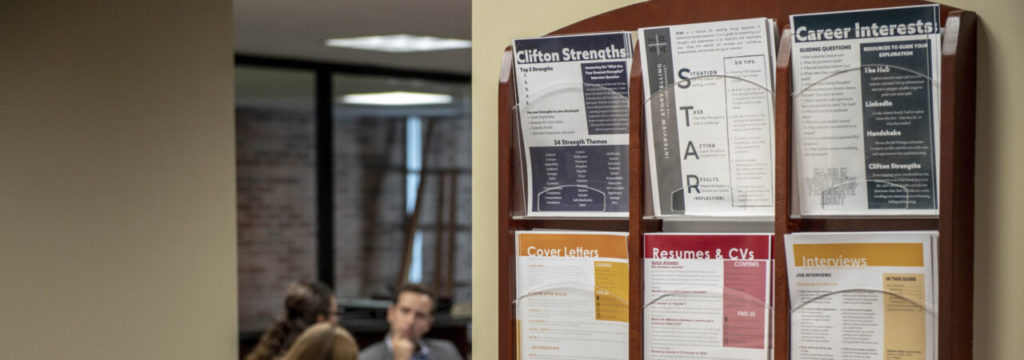
Written by Katrin Surkan
The post-college search for work can be nerve-wracking. After becoming expert students from the ages of 5 through 22, we are expected to know where to begin becoming experts in a world where we are paid for our skills. The four-ish years of college encourage young adults to find themselves, but then they are loosed to find a job. I am one of the lucky ones, coming into my senior year with a contract for post-college work. How did I find my job after college? Some luck, some preparation, and plenty of help.
I received some excellent advice all four years, and that helped me gather courage, experience, and the necessary information to take the next step in my search.
- Adapt your resume to the job description.
Make the resume easy to read. Fix formatting, keep all descriptions to one line, have a maximum of three descriptions per experience (remove the subjects and start with an active, exciting verb that ideally was in the job description itself), and sort by most recent date on top. Divide your resume into three or four categories that pertain to the job you are interested in (e.g. Experiences, Education, Extracurriculars, Leadership, Honors and Awards, Skills, Languages, Adventures, etc.). Keep it neat and to one page.
- Get started by doing something, anything!
Start early—freshman year—trying out (even volunteering for) jobs, opportunities, and internships that might interest you as a career. You may find that you hate something you thought you loved. Or that you could be paid for something you already do. Or you might fall in love with something that you had not known existed. Say yes to random little chances to help people, internship applications, on-campus jobs, talking to strangers, and anything that piques your interest. Better to know sooner rather than later what matters to you!
- Get an interview.
I was a horse tour guide in Iceland for a summer. Even though that has little to do with my potential careers, it makes interviewers more likely to invite me in to speak because they want to know more. I am sure you have done something that few people know much about, so get them to invite you in to ask questions by putting it noticeably on your resume or mentioning it in your email. It also helps to know what the person you are writing to (HR manager, intern coordinator) enjoys hobby-wise, so see if you can hunt down a hobby or two of theirs.
- Play to your strengths.
If you have excellent soft skills, go network and meet people. Apply for jobs that have you managing or dealing a lot with people. Look for opportunities to help or support others, as it will make them more likely to reciprocate—and jobs come from the most unlikely places! If you are introverted, focus on your skills and strengths in applications. Emphasize your abilities and expertise. Find a group that needs what you can offer.
- Be not afraid!
Employers were once young job seekers like you, and people are more helpful than you might expect. Ask questions, ask for the job, ask for an informational interview over LinkedIn or through Career Services. Talk to people you respect and to people who intimidate you. Chances are, you are just what they were looking for.
- Get an on-campus job.
Already, my freshman year, I began applying for on-campus jobs, practicing my cover letters, resumes, and informational interviews where little was on the line. By taking a small job on campus, I also acquired a reference for future applications! To help with my resume and letters, I met with Career Services and attended events that looked interesting, like the talk by an alumnus who graduated with a degree in philosophy and became a cybersecurity contractor. He inspired me to…
- Think beyond the major!
My degree is a mark of my interests rather than my skills. Yes, as an economics major, I can talk about supply and demand, but I could do anything with it!
Some alumni who have gone on to do fantastically interesting careers are…
Phillip Wegmann, ’15, a political economy major, is a correspondent at the White House
Kelsey Brakel, ’12, a biology major, became a veterinary pathologist
Stephanie Benson, ’03, a Hillsdale student-athlete who started a restaurant in Mississippi
Rob Schlitts, ’06, a communications major, founded a phonathon company, Wilson-Bennett Technology
Margaret Handel, ’17, an English major, became a commercial mariner
Madeline Johnson, ’17, a philosophy major, became an urban planner
Lydia Hall, ’19, an English major, became an associate production editor
Albion Student Selected for International Workshop
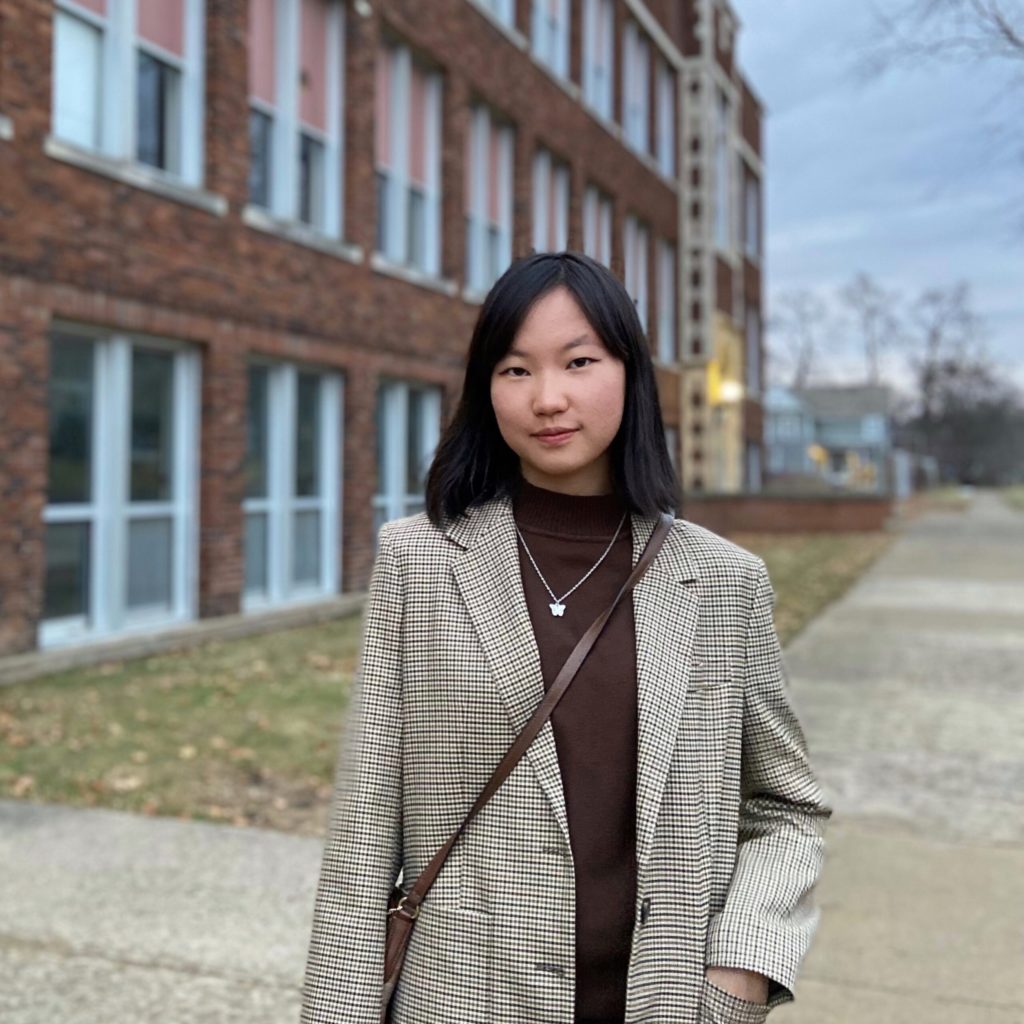
Enkhmaa Buyanbadrakh ’26 recently was selected to attend the Leaders Across Borders workshop scheduled for next year in Northern Ireland.
The workshop focuses on developing intercultural competencies and conflict mediation skills. It is coordinated by Ohio Wesleyan University, and supported through the Mellon Global Crossroads Initiative via the Great Lakes Colleges Association.
The workshop aims to help students acquire and/or apply cross-cultural communication skills; utilize intellectual curiosity about other cultures, peoples, and ethnicities; and demonstrate peer leadership and conflict mediation skills.
From May 20-27, 2025, the students will participate in the Leaders Across Borders Workshop in Belfast, Northern Ireland.
Buyanbadrakh, an international student from Mongolia, is a double major in computer science and accounting with C.P.A. emphasis. April Grow, a technical lecturer in the Mathematics and Computer Science Department, said Buyanbadrakh is a distinguished student in the classroom and actively engaged with various groups on campus.
Buyanbadrakh is president of the Asian Cultural Engagement Group, a global peer advisor for other international students, an undergraduate research fellow with the 2024 FURSCA program, and volunteers as a VITA tax preparer. She also is a member of Phi Beta Kappa honor society and Omicron Delta Kappa honor society.
Calvin University Expands Degree Completion Programs to Serve Adult Learners
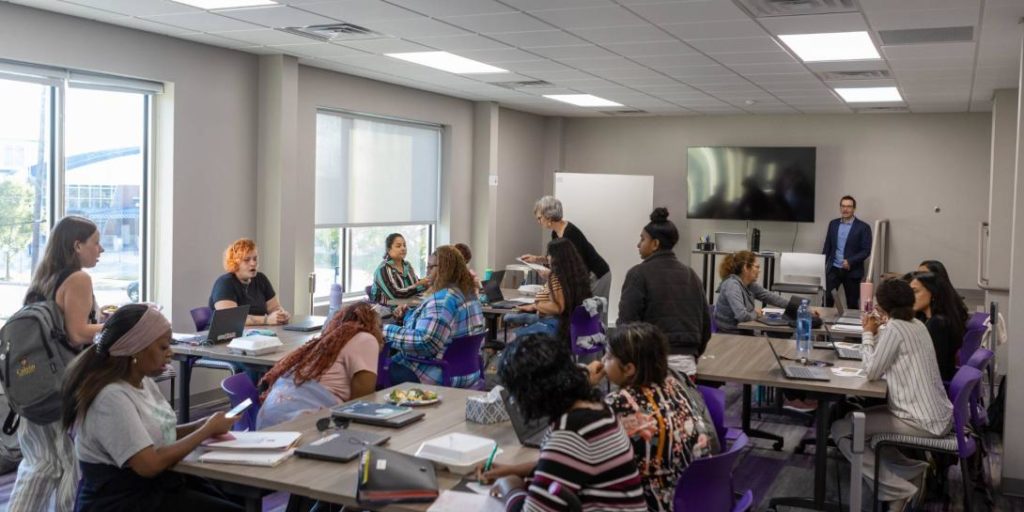
Written by John Zimmerman
Calvin University announces the launch of new programs designed for adult learners who started a bachelor’s degree but never completed it. Nearly two million Michiganders have some college credits but no degree, a significant portion of the state’s population. Calvin’s new degree completion programs offer two interdisciplinary, career-focused options to help this population complete their degree: Applied Leadership and Human Services.
“I’ve seen how earning a bachelor’s degree can impact the lives of adult learners,” shared Abbie Lipsker, director of continuing studies at Calvin. “From enhanced career opportunities to personal dream fulfillment and a more expansive view of the world, earning a BA can set whole families on a better trajectory.”
A Broader Vision for Lifelong Learning
These new programs are part of the university’s strategic expansion to address the needs of nontraditional students who are seeking an accessible, high-quality education that will advance their careers and their community impact. “Calvin University’s mission has always been rooted in serving a diverse range of learners, equipping them for leadership and service,” said Kevin den Dulk, associate provost. “These new programs reflect our ongoing commitment to opening doors for adult students, helping them overcome barriers and achieve their academic and professional goals.”
Hybrid Learning: Balancing Place-Based with Online
Built to ensure persistence, adult learners in these programs will meet on campus one evening per week alongside a cohort. With awareness of the competing priorities of adult learners, some coursework can be completed online asynchronously. “We understand the value of networks and learning from each other, especially in adult learner communities, where students bring so much prior learning to the classroom,” said Lipsker. “While much of the coursework can be done on a student’s own time during the week, having a place-based aspect will deepen the experience and facilitate interpersonal connections.”
Addressing Regional Workforce Needs
The Applied Leadership and Human Services degree completion programs join a growing roster of initiatives designed to enhance regional workforce development. Calvin offers a variety of non-credit professional development programs, such as Second Chance Hiring for HR professionals, as well as master’s degrees in nearly a dozen fields, including a Master of Social Work, the newest addition coming in fall 2025. These programs highlight the university’s commitment to meeting community and industry needs.
A Vision for the Future
The expansion aligns with Calvin’s Vision 2030 strategic plan, which emphasizes service to the city as a trusted partner, including offering accessible, flexible learning options that promote a thriving, healthy community. “Calvin’s mission invites us to think expansively about education,” den Dulk added. “We are excited to welcome a new wave of learners who will bring their talents and experiences to our Christ-centered community.”
Learn more about Calvin’s bachelor’s degree completion programs at calvin.edu/go/complete.
Creating Connections: How Generosity Is Shaping Futures at CCS Scholarship Luncheon
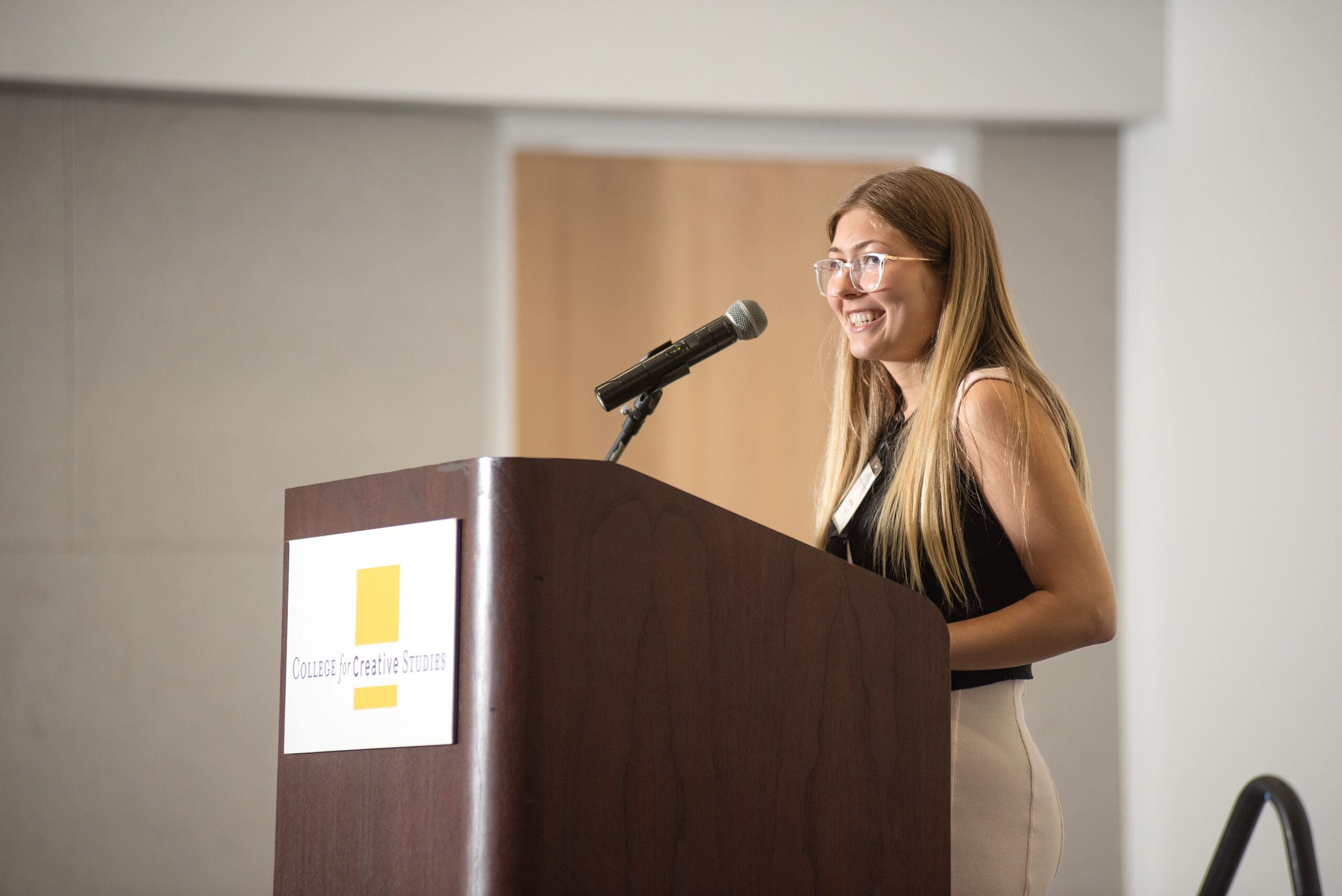
Photo Credit: Lesley Mason ’00 Photography
At a recent donor appreciation luncheon hosted by the College for Creative Studies, donors and scholarship recipients gathered in the General Motors Auditorium at the A. Alfred Taubman Center for Design Education to celebrate the transformative power of education – and the generosity that makes it possible. Held on October 22, the event provided a meaningful platform for heartfelt connections between those who give and those who benefit from their support.
Jim Nicholson, Chair of the Board of Trustees, spoke about the profound impact philanthropy has on the college community. “Every scholarship represents a story of hope and ambition,” he said. “It’s our responsibility to invest in these talented individuals who will shape the future of our industries. Your contributions are not just financial support, they are lifelines that help students reach their full potential.”
As attendees listened, they were reminded of the difference philanthropy makes for students navigating the challenges of college. Guests heard firsthand how scholarships have transformed lives, opening doors to education and brighter futures.
A senior scholarship recipient at CCS shared how pivotal his scholarship has been to his journey. “About four years ago, I didn’t think I would have the opportunity to graduate from CCS… I genuinely had no clue how I would afford college, much less a school as prestigious as this one.” Now on track to graduate in 2025, he expressed deep gratitude for the experiences his scholarship made possible, from studying abroad to gaining skills and mentors that have “changed the trajectory” of his life. “This career path wouldn’t have been possible without donors taking a chance on me,” he said, adding that he hopes to one day support students just as he has been supported.
For him and many others, scholarship support has been the difference between dreams deferred and dreams realized. Another scholarship recipient shared her journey to CCS, recalling both the excitement of her acceptance and the sense of relief that came with receiving scholarship support. Receiving the Alumni Scholarship, she said, was the moment she could finally focus on what truly mattered: making art. “Thanks to your generosity, I’m able to accomplish what I’m really at CCS to do: make art … I’m forever grateful that you choose to value our education, our artmaking and our financial success as young adults.”
CCS President Don Tuski emphasized the vital role scholarships play in shaping students’ futures. “I’ve witnessed firsthand the profound impact that scholarships have on our students’ lives. Your support not only lightens their financial load but empowers them to explore their full potential and push the boundaries of creativity,” he shared. “Today, we celebrate not just education, but the transformative role that creativity plays in shaping our future.”
Tessa Semma Jarbo, whose sister Kacy Semma Hall graduated from CCS in 2006, spoke movingly about the inspiration behind the scholarship that honors her sister’s memory. “Kacy’s cancer diagnosis became an invaluable lesson that life is not guaranteed for anyone and time is our most precious resource,” Jarbo shared. In establishing the Kacy Semma Memorial Scholarship, she and her husband Johnny sought to pay tribute to Kacy’s “creative spirit and commitment to nurturing the next generation of artists and designers.” She expressed their hope that the scholarship will “not only provide resources but also inspire recipients to give back to the creative community, continuing the cycle of inspiration that Kacy started.”
Katie Rusak, CCS Director of Advancement, echoed the importance of connecting donors with the students they support. “These moments of connection are what it’s all about,” Rusak shared. “Your support not only provides critical financial assistance but inspires our students to pursue their passions and dreams. We are here to recognize the profound impact scholarships have on our students’ lives, opening doors to opportunities that might otherwise remain closed.”
In closing, Rusak expressed heartfelt appreciation: “On behalf of the entire CCS community, I extend my heartfelt thanks to each and every one of you,” she said. “Your belief in our mission and in our students makes all the difference. You empower students to pursue their dreams without the burden of financial worry, and for that, we are forever grateful.”
